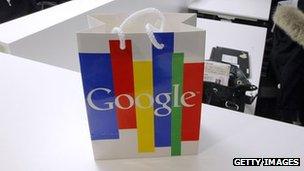Google adds IBM patents as it looks to future
- Published

Google's patent shopping bill has so far run into billions of dollars
Google has gained hundreds of patents from IBM as it continues its intellectual property spending spree.
It has acquired 187 patents and 36 applications, adding to the 1,000 it purchased from IBM last summer.
The latest patents include a system for "using semantic networks to develop a social network".
Google has spent billions building its technology rights portfolio, including a $12.5bn (£7.7bn) deal for Motorola Mobility.
The California-based company has been actively bolstering its patent catalogue in the face of lawsuits from key competitors such as Apple and Microsoft.
Among the patents acquired in this latest deal isUS Patent 7,865,592, externalwhich relates specifically to social networking sites, allowing "identifying common interests between users of a communication network".
Vicki Salmon, the chair of the litigation committee of the UK Chartered Institute of Patent Attorneys, believed this might be a nod that Google was moving from protecting existing technology and beginning to plan for the future.
"When you start you have to play catch-up," she told the BBC.
"When you've finished playing catch-up and you've got yourself in a stronger position, you then can begin to look forward."
Other patents included a method forusing web-based applications across additional devices, external, and an intriguingly titledcomputer phone, external.
Neither Google nor IBM would comment on the deal when approached by the BBC.
'Get real'
Last year, Google accused its competitors of buying up what it called "bogus patents" in order to slow the development of its Android operating system.
However, the company now appears to have succumbed to the same approach as it adds the IBM patents to a portfolio that also includestechnology for driverless cars.
"Although you can object to a lot of cost of inconvenience by virtue of people enforcing their patents, the patent system still exists," Piers Strickland, a lawyer specialising in mobile telephone patent litigation, told the BBC
"In order to engage with that you've either got to take licences from from people's patents, and/or aggressively increase your bartering position by buying patents.
"I think they've realised that they just had to get real, and understand that you can't just ignore the system."
Google's agreement to buy Motorola Mobility,announced in August last year, includes 24,500 patents, many of which could be used to defend the use of features on its Android mobile operating system.
The purchase is currently beingreviewed by competition regulators.
'Turf war'
Google's Motorola move came off the back oflosing out on buying the 6,000-strong patent portfolioof bankrupt telecoms firm Nortel. It was outbid by a consortium of companies including Apple, Microsoft and Blackberry manufacturer Research in Motion.
"The reality is that you've got a fairly vicious turf war going on between the different operating systems," explained Ms Salmon.
"People want to be in there, and they want their platform established and people to be using them."
Google is just one of many technology companies involved in patent lawsuits which seek to slow down competition or strike lucrative licensing fee settlements.
On Wednesday, US mobile operator AT&T was forced to pay Tivo - the digital video recorder specialist - $215m plus additional undisclosed monthly licensing fees.
The fee will vary depending on AT&T meeting growth targets for digital video recording customers until 2018.
"No matter which projections you take, they all involve AT&T paying us significantly higher revenue than $215m," Tivo chief executive Tim Rogers said.
- Published8 March 2012
- Published7 October 2011
- Published4 August 2011